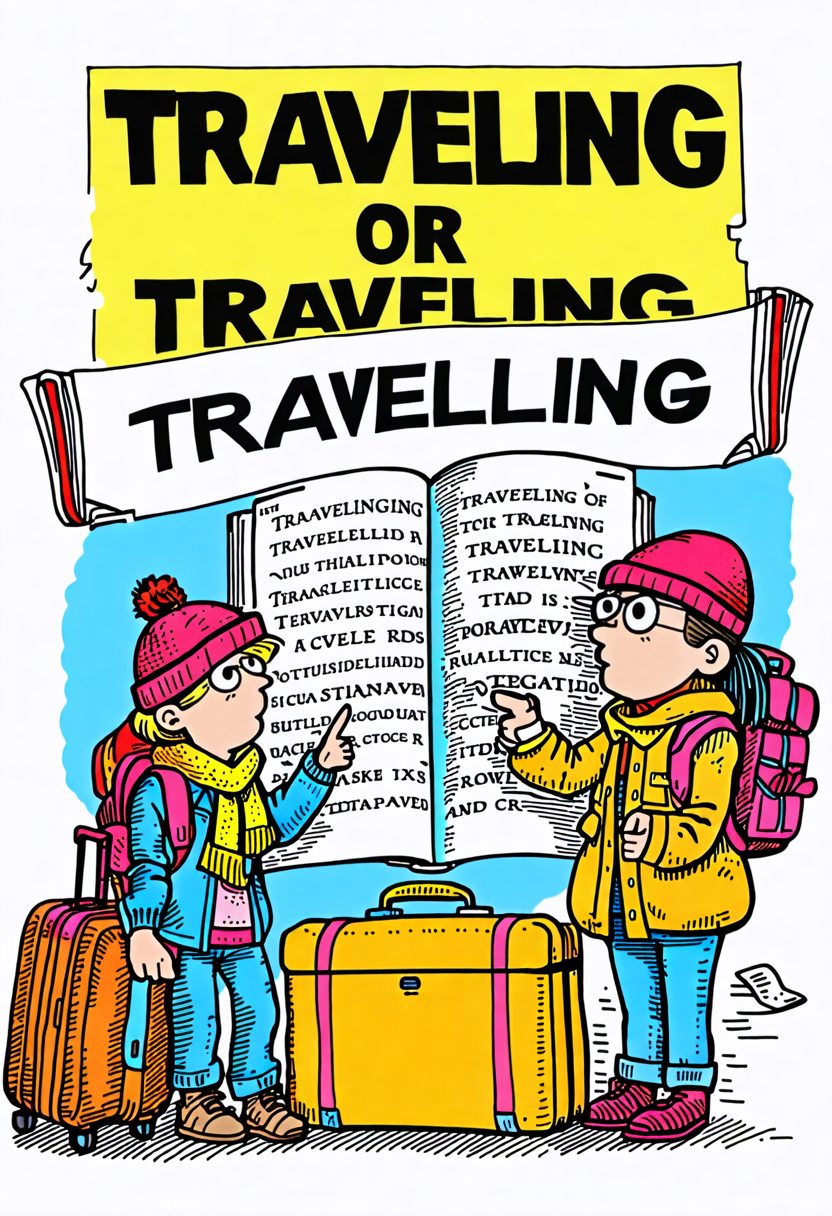Traveling or Travelling?
The difference between “traveling” and “travelling” is purely regional. “Traveling” is commonly used in American English, while “travelling” is the preferred spelling in British English. This difference stems from variations in spelling conventions, with American English often simplifying by using a single ‘l’. British English maintains the traditional double ‘l’ usage.
Understanding the Spelling Variations
Understanding the spelling variations between ‘traveling’ and ‘travelling’ requires examining the differences between American and British English. Both spellings are correct, and the choice largely depends on which form of English is being used.
In American English, the word is spelled ‘traveling,’ with a single ‘l.’ This follows the American rule where the consonant is not doubled if the stress is on the first syllable of a multisyllabic word.
In contrast, British English spells it as ‘travelling,’ with a double ‘l,’ adhering to their own spelling conventions.

British Vs. American English
The distinction between British and American English manifests in various aspects, including spelling conventions. One prominent example is the difference in how words like “traveling” and “travelling” are spelled. In American English, the single ‘l’ in “traveling” follows standard spelling rules, while in British English, the double ‘l’ in “travelling” aligns with their linguistic traditions.
| Aspect | American English | British English |
|---|---|---|
| Spelling | Traveling | Travelling |
| Usage | More Common | Less Common |
| Examples | NY Times | The Guardian |
| Origin | Simplified | Traditional |
| Audience | U.S. Readers | U.K. Readers |
The Rule of Doubling Consonants
Another important distinction between British and American English lies in the rule of doubling consonants when adding suffixes. In American English, the general rule is to double the consonant when the stress falls on the final syllable of the base word.
For example:
- ‘Travel’ is a multisyllabic word with stress on the first syllable.
- Consequently, Americans spell it as ‘traveling’ without doubling the ‘l.’
British English, however, tends to double the consonant regardless of syllable stress.
As a result, ‘travelling’ is the preferred spelling in the UK.
Impact of Audience Location
When choosing between ‘traveling’ and ‘travelling,’ consider the location of your audience to guarantee proper regional usage. In American English, ‘traveling’ is the correct form, while ‘travelling’ is preferred in British English. This distinction guarantees that your writing aligns with the expectations of your readers.
For instance, if you are writing for a primarily American audience, using ‘traveling’ will feel more natural and familiar to them. Conversely, if your audience is based in the UK or other Commonwealth countries, ‘travelling’ will be more appropriate.
When to Use “Traveling”
In American English, ‘traveling’ is used when referring to the act of going from one place to another. This spelling aligns with standard conventions in the United States, where the single ‘l’ is preferred in many similar words. The choice to use ‘traveling’ often depends on the target audience and the context of the writing.
Examples of ‘traveling’ in American English include:
- Traveling for business: Many professionals are traveling for work-related meetings.
- Vacation plans: Families are traveling to various destinations for their holidays.
- Sports teams: Athletes are traveling to compete in out-of-state tournaments.
- News contexts: Reporters are traveling to cover significant events.
When to Use “Travelling”
Similarly, ‘travelling’ is the preferred spelling in British English, aligning with the conventions used in the UK and many Commonwealth countries. This spelling is used in formal and informal writing, including newspapers, magazines, and academic texts. British publications like The Guardian and the BBC consistently use ‘travelling’ when describing movement or journeys.
In addition to the UK, countries such as Canada, Australia, and New Zealand also favor ‘travelling.’ This spelling follows the general British English rule of doubling the consonant in multisyllabic words when the stress is not on the final syllable.
Examples in American Publications
American publications consistently use ‘traveling’ to align with standard American English spelling conventions. This practice is evident across a wide range of notable American media outlets and literature. For instance, in the New York Times, articles frequently mention ‘traveling’ in discussions about global events and personal journeys. Similarly, travel-focused magazines like Conde Nast Traveler adhere to this spelling in their content.
Popular American blogs and websites also follow suit, ensuring consistency in their articles. Examples include:
- The New York Times: ‘Traveling through Europe is a unique experience.’
- Condé Nast Traveler: ‘Traveling to exotic destinations.’
- USA Today: ‘Tips for traveling on a budget.’
- National Geographic: ‘Traveling to remote locations for research.’
Examples in British Publications
Numerous British publications use ‘travelling’ to align with standard British English conventions. This spelling preference is consistent across various reputable sources. For instance, newspapers like The Guardian often use ‘travelling’ in their articles. Similarly, The Telegraph and the BBC adhere to this convention. By doing so, they maintain linguistic consistency and cater to their British audience. Below is a table illustrating examples from prominent British publications:
| Publication | Example Sentence | Context |
|---|---|---|
| The Guardian | “Travelling to the countryside is a popular weekend activity.” | Weekend travel article |
| The Telegraph | “Travelling abroad has become easier with new policies.” | News on travel policies |
| BBC News | “She enjoys travelling to historic sites.” | Personal interest story |
| Daily Mail | “Travelling within the UK is affordable and convenient.” | Domestic travel piece |
| The Independent | “Travelling by train offers scenic routes.” | Transportation feature |







